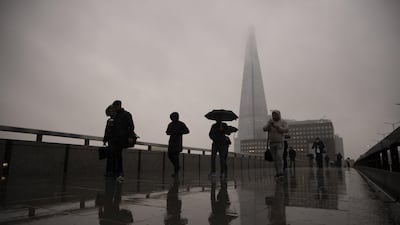UK public sector borrowing hit £8.8 billion ($12.27bn) last month, the first January deficit for a decade and the highest figure for the month on record, highlighting the challenge UK finance minister Rishi Sunak faces as he prepares for the budget on March 3.
Government borrowing climbed to £270.6bn in the first 10 months of the fiscal year, according to data from the Office for National Statistics, reflecting the immense cost of the pandemic support measures so far.
Separately, British retail sales plunged 8.2 per cent in January from December as non-essential shops went back into lockdown in England and were hit with tighter restrictions across the rest of the UK.
Mr Sunak said the £280bn invested in protecting jobs, businesses and livelihoods since the start of the pandemic “is the fiscally responsible thing to do".
“We’ve been able to respond comprehensively and generously through this crisis because of our strong public finances. Therefore, it’s right that once our economy begins to recover, we should look to return the public finances to a more sustainable footing,” he said in a statement on Friday.
Britain's economy has been hammered by the Covid-19 crisis, with gross domestic product plunging 9.9 per cent last year in the worst economic slump in over 300 years.
While Mr Sunak has indicated that tax rises or spending cuts will eventually be needed, business lobbies and economists say acting too soon would hamper Britain’s recovery.
Earlier this week, the Institute for Fiscal Studies said Mr Sunak needs tax rises of about £60bn to balance the books following the Covid-19 crisis – but the think tank warned that the March budget would be too soon to make such a move.
That message was reinforced by the Resolution Foundation, which said earlier this week that almost one in 10 UK workers expect to lose their jobs in the next three months when support measures are tapered off.
January’s £8.8bn borrowing comes in a month that normally generates a surplus as payments of self-assessed income tax, corporate tax and Christmas sales taxes flood into the Treasury.
The increase in borrowing has led to a sharp rise in the national debt, which now stands at £2.11 trillion.
While it was the first January shortfall for 10 years, Paul Dales, chief UK economist at Capital Economics, said total tax revenues were only a little lower this January than in the same month in 2020, at £80.3bn versus £81.1bn.
“So the deficit was mainly due to the leap in spending to £81.9bn from £62.2bn. With the economy contracting, the Chancellor should resist the urge to try to claw back some revenue in the Budget on March 3 and instead continue to support the economy,” he said.
Meanwhile, the slump in retail volumes was the second largest on record after the fall in April at the start of the pandemic, with department and clothing store sales particularly affected.

However, the decrease seen during England’s third lockdown was not as large as the first lockdown, “as some stores have adapted to the current circumstances, with services such as click-and-collect helping to cushion the fall”, said ONS statistician Jonathan Athow.
Online spending hit a record proportion of 35.2 per cent of all sales, while sales at food outlets were boosted by the closure of pubs and restaurants across the country.
“While non-grocery stores took the brunt of the pain, with sales volumes declining by a quarter, they were still over 50 per cent higher than in the first lockdown last April,” said Lisa Hooker, consumer markets leader at PwC.
"As with last year, online made up the slack, with consumers turning to their phones and PCs to shop in record levels. While the first quarter of the year is traditionally quieter for retailers, stores will be hoping that a rapid re-opening will allow shoppers to spend the estimated £10,000 that households have saved on average during the lockdowns.”










Britain's rollout of Covid-19 vaccinations - Europe's fastest delivery so far - has raised hopes of an economic rebound later this year with Friday’s GfK consumer confidence survey showing British consumers were their most confident since the pandemic started almost a year ago.
“Overall, the only good thing about the current lockdown is that it’s no way near as bad for the economy as the first one in March/April last year,” said Mr Dales.
“But at least the rise in the GfK measure of consumer confidence from -27 in January to -23 in February provides an early sign that vaccinations are brightening the outlook."
Further indication of a brightening outlook came from the IHS Markit/CIPS flash composite Purchasing Managers' Index (PMI), which acts as a gauge of economic health. While it still came in below the 50 mark, which separates growth from contraction, it rose to 49.8 in February, suggesting activity has stabilised following a big fall to 41.2 in January.
"Although the data hint at a renewed contraction of the economy in the first quarter, business expectations for the year ahead improved to the highest for almost seven years, suggesting the economy is poised for recovery," said Chris Williams, IHS Markit's chief business economist.
In the eurozone, business activity contracted again in February, as lockdown measures to contain the coronavirus hammered the bloc's dominant service industry, with IHS Markit's flash composite PMI edging a little higher to 48.1 in February from 47.8 in January.



